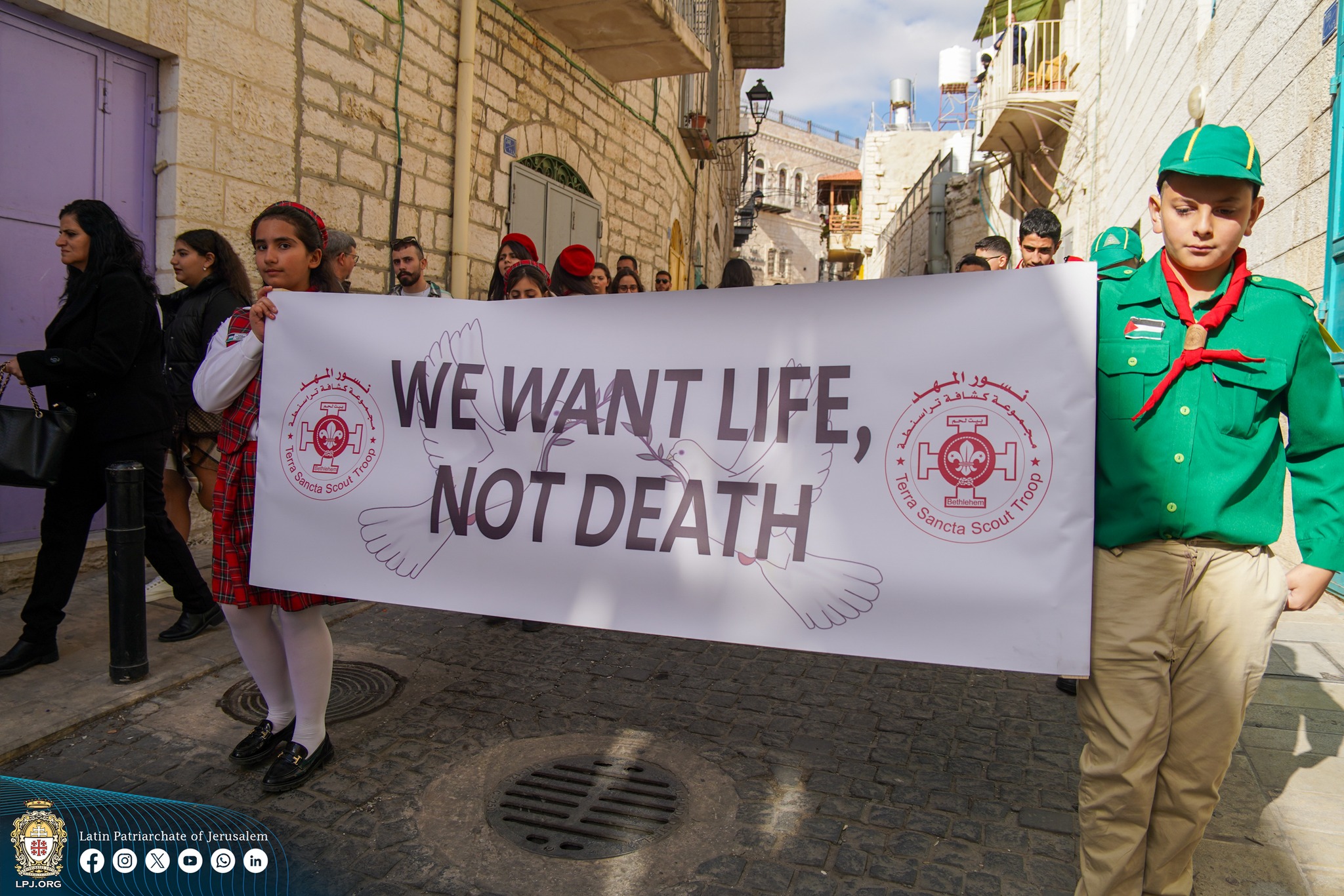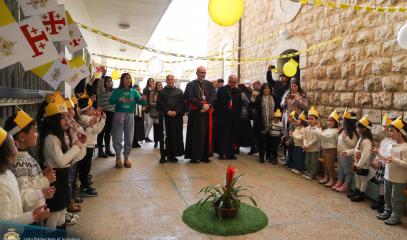Bishop Nahra: donating a kidney, and other 'small gestures' offer hope to Israelis and Palestinians
The vicar of the Latin Patriarchate of Jerusalem speaks about small stories amid war, an Israeli Jew donating an organ to an Arab in need of a transplant, a wonderful “sign” to behold. Although “Hatred, unfortunately, drops on you,” people must work together to build. The prelate spoke about the tensions that characterise the first phase of the ceasefire agreement, stressing that long-term perspectives are needed. He also appealed to pilgrims: “we are waiting for you.”
Milan (AsiaNews) - In this Jubilee year, hope for Christians in the Holy Land is “founded in God” and can be seen “in small signs, in encounters between people,” said Mgr Rafic Nahra, auxiliary bishop of the Latin Patriarchate of Jerusalem and patriarchal vicar for Israel since 2021.
“I remember in recent months, in the middle of the war, an Arab acquaintance of ours needed a kidney and it was an Israeli Jew who donated it to him. These are small, wonderful gestures, and we must look at these things.”
For the prelate, originally from Lebanon, it is important also to dwell "on the beautiful things that are out there. Peace and love must be built because they do not come on their own. Hatred, unfortunately, drops on you, but we know that there are also many good people with whom one can work and try to undertake joint initiatives.”
Tensions rose recently in the region, with the risk of a collapse of the fragile truce that brought some relief to the population of Gaza battered by more than a year of war.
The ceasefire has also allowed some Israeli hostages held by Hamas since 7 October 2023 to come home to their families while others are still waiting to embrace their loved ones again.
“This week the situation saw greater tensions. It wasn’t clear whether ‘Phase A’ of the ceasefire and the exchange of hostages for [Palestinian] prisoners would last or not,” said the bishop.
The diplomatic work by the various stakeholders, as well as regional and world powers, made it possible to shore up the fragile agreement, halting the winds of war that are still blowing from both sides, in particular from Israel’s extreme right pressing for escalation.
“On the surface, the truce seems to be holding, but it is clear that the whole situation is not stable, with huge consequences in people's daily lives, starting with rising prices, since the war has also had an economic and social cost. Everything is very expensive.”
For Bishop Nahra, the priority now is “to put an end to the war” even if “certain groups on both sides, even now, are preparing for war.” In Gaza, “Israel continues to attack armed groups,” while in the West Bank, “some people want to continue the resistance. Honestly, there won’t be any end to the violence anytime soon but, for the time being, all we can hope is to move from a temporary truce to an end to the armed conflict.”
“Long-term solutions are needed; we cannot think of freezing the conflict and then start again in five or 10 years. We need a solution that is forward-looking" for a society that "is sick"; in Palestine but also in Israel, where the hostage crisis “fuels great tensions” since it remains "a small country and many families are involved and affected.”
One unresolved issue, for Christians and for the Latin Patriarchate of Jerusalem, is the relationship with Jews. "There are small groups who are trying to engage in dialogue again,” but critical issues remain and people are far apart.
“Israel expected the Church to take another position on the war, but ours is a position of peace, of justice, one that Israel has not accepted and trust has been lost.” Yet, if in the early stages of the conflict, "there were no more contacts, some steps have been taken in the past few months.”
“Here in Nazareth, for example, I see small groups of Israelis who are beginning to visit us on Saturdays, which is a good sign. Small, but important. Part of the [Israeli] population continue to view us as outsiders; others understand that we must live together and build a shared life; we cannot stay like this for long.”
In terms of pastoral challenges, “one of the priorities for the patriarchate remains working with families at different levels. Another serious, unresolved problem is violence in Israel’s Arab community, which is not connected to the war in Gaza,” Bishop Nahra said.
“Many people are killed by organised crime groups, many within Israeli Arab society are involved; in response, many families choose to leave, leave the country or leave Arab towns to live in mixed ones, because they feel safer.”
This is a “very serious problem,” the prelate stressed, but “we still don't know what to do: We talk, we ask, we inform ourselves, but it has remained unresolved for far too long.”
Meanwhile, “we must encourage people to stay, give them a reason to do so. If young people, as Christians, today cannot imagine themselves staying, they will go elsewhere because life is becoming hard.”
“We are called to prepare them, so that they may know their faith better; in knowledge and prayer, life and the sense of belonging is also strengthened.”
Finally, the patriarchal vicar for Israel reiterated the appeal issued last month by the Latin Patriarch of Jerusalem, Card Pierbattista Pizzaballa, and the Custos of the Holy Land, Fr Francesco Patton, on the subject of pilgrimages.
“We really hope that pilgrims will return to the Holy Land, because their presence is of great assistance at all levels, not only economic. Pilgrims can come, people can come, even if it is clear that the situation can and must improve.
“But for groups that come to Jerusalem it is also possible to visit Galilee and even Ramallah, Bethlehem. If they do, it is not only good for them, but it is also great support and help for the whole Church of the Holy Land. Pilgrims, we are waiting for you.”
(Photos from the Latin Patriarchate Facebook page)








.png)










